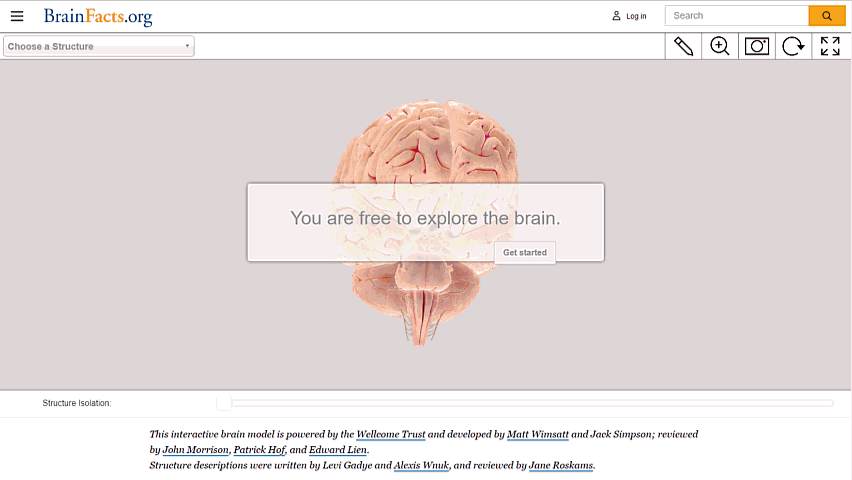
Redesigned BrainFacts.org to Debut With Interactive Brain Model

The Society for Neuroscience will debut a redesigned BrainFacts.org at the end of October with a more audience-centric approach that engages users in learning about the brain through interactive content, such as a 3-D brain model.
Imagined for users of all ages and backgrounds, BrainFacts.org introduces individuals to the anatomy of the brain and brain health, as well as offers educational resources for bringing neuroscience into classrooms.
“BrainFacts.org is and always has been designed for the public,” BrainFacts.org Editor-in-Chief John Morrison said. “With this redesign, we are reimagining how we can teach about the brain to make information even more accessible. Our new content makes it even easier for people to find the answers to their questions and to understand how neuroscience affects their daily lives.”
With continued support from founding partners The Kavli Foundation and the Gatsby Charitable Foundation and investment from a new funding partner, the Wellcome Trust, BrainFacts.org is creating additional opportunities for non-scientists to learn about the brain. New multimedia including videos, podcasts, infographics, diagrams, and interactive graphics will engage users in all kinds of learning — visual, auditory, reading/writing, and kinesthetic.
The most dynamic of the interactive elements is the new 3-D Brain, which can be rotated and disassembled to allow visitors to visualize the brain’s anatomy and structures and to see how these structures fit together. Hovering over an individual area provides the name of the structure, and clicking provides information about the function of that particular structure and links to any related structures.
The website will also feature new interactive content that makes the Neuroscience Core Concepts — eight things everyone needs to know about the brain — more easily understandable and relatable to everyday life. Identified by SfN’s Public Education and Communication Committee as the most essential to a foundational understanding of the brain, the eight Core Concepts are:
- Your Complex Brain
- How Neurons Communicate
- How Your Brain Processes Information
- How Experience Shapes Your Brain
- Reasoning, Planning & Solving Problems
- The Power of Language
- The Source of Curiosity
- How Research Benefits Human Health
BrainFacts.org also revised its navigation to more quickly connect visitors with the information for which they are looking, and the home page will feature the most recently uploaded content in each topic area, encouraging user engagement with new content.
Other new features will encourage both deeper and tangential learning by indicating types of content, suggesting related topics, and providing additional sources for further research. Content is searchable by type, concept, and grade level, and symbols indicate type of content and length, if audio or video. A progress bar at the top of the page shows readers how much of an article they have read; discussion questions and hyperlinked references may assist teachers and students in an educational setting; and content areas promoting related topics and trending articles provide opportunity for discovery of topics for which readers may not have otherwise thought to look.
By creating new, interactive opportunities for engagement, BrainFacts.org will more deeply inform the public about neuroscience, advancing SfN’s mission of promoting understanding of the brain and nervous system and growing support for the field.



















